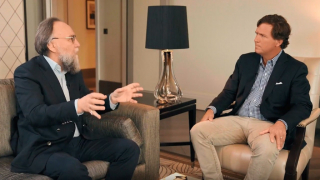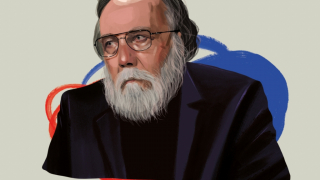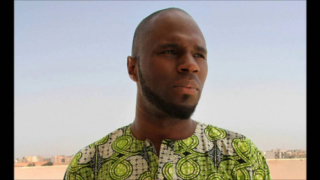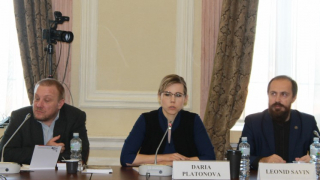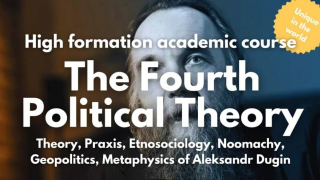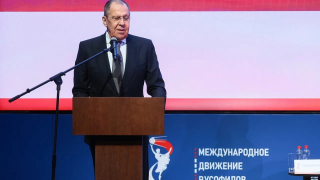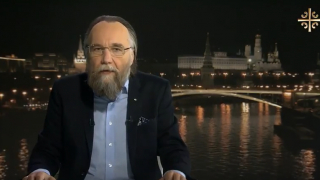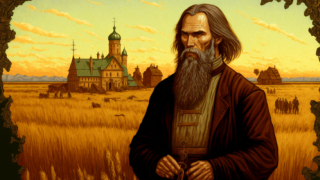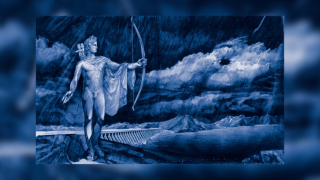Politica Aeterna and the end of globalism
- Welcome and thank you for accepting the invitation, Professor Alexander Dugin!
- Salam alaykum!
The Globe without answer
- Is the Corona pandemic shaping the new international order as did the black plague pandemic in XIV century?
It is difficult to make a prophecy because the history is open. What is sure that pandemic situation has changed the main rules of the structure of the world because I consider that it is the greatest failure of globalization, of globalism, because when something serious happened to the humanity on the global scale – not on the national scale, with the national economy or the problem with some political regime or some society – but when the humanity was attacked by omnipresent threat of pandemia, the global system that was so proud to solve all the problems on the global scale has totally failed, and the unique solution that everybody accepted – democracies, semi-democracies, non-democracies – everybody had only one solution to close the borders, to return to the national states, to isolate themselves. It was a kind of natural reaction and globalists on the global scale didn't propose anything at all that, in my opinion, is the end of the global world and there is the new multipolar world that is emerging instead.
It is not just nationalism but it is revision of the present state taking in consideration that unipolarity has essentially failed in the moment we really needed some global answer and there was no answer at all, so everybody tries to save himself or herself by own tools, own means so that means the end of the confidence and the global institutions so that is a big greatest failure, the end of globalization and new world, the multipolar world emerging.
Why Plato?
- Many people have contacted me and blamed me to choose this book as the title [Political Platonism: the philosophy of politics], they blame me to have chosen this book, they want books about geopolitics, the Fourth political theory, Eurasianism but during my reading, your phrase came as an enlightenment. It says that anyone who does not know or understand Plato cannot know or understand anything. Plato is the creator of philosophy, theology, science and politics. Could you explain more this to our audience please?

For example, let's start with politics. When we start to study politics, first of all we need to understand what is and or what was the philosophy on which one or another political system, political thought, political doctrine was built on. When we consider the European, Western, occidental tradition of politics, we need to get to the roots. And everything or maybe almost everything starts in the West with Plato. So, Plato was the first and main and still is main philosopher of the West. It is the first and main political philosopher of the West. The West basing on the foundations of Plato’s philosophy has expanded its understanding of what is the reality, what is the man, what is political structure, what is the hierarchy, what is the State on almost all humanity, so we need at least to know that, we have all the right to know what is the essence or the origin of Western way of political and philosophical thinking.
But not only the West was influenced by Plato and all kind of political Platonism starting from his a little bit heretic disciple Aristotle, but as well the Neoplatonist tradition that has defined almost all theology of the Christian world. Plotinus in different forms has influenced almost all religious thought in the West. Not only in the West, because Islamic thought was under great influence of Plato and Aristotle. Some texts of Aristotle were indeed the texts of Neo-Platonists, but that is one and the same.
So, when, for example, Ibn Sina or Al-Farabi have spoken about Aristotle, they have meant Neoplatonist Proclus or Plotinus or Porphyry’s books. The Platonic thought has entered in the Mediterranean zone of civilization, Western and Islamic and pre-Islamic up to a certain level and that was one of the main sources of any form of political philosophy. When we try to deconstruct modern political philosophy, we understand how far from Plato's philosophical thought it is, but we nevertheless should make the comparison, because if we don't understand what was the starting point, we will not understand what is the finishing point, we will not grasp the meaning of political and philosophical process in the West and outside of the West. So, I still think that Plato is essential. I have written more than 60 books on different subjects: the Fourth political theory, geopolitics, Noomakhia (we will speak maybe about that later), but I consider that to deal with the West in the present state, in the past, in the history, we are obliged to learn Plato as well as all the forms of direct and indirect influence (Neo-Platonists, Aristotle) of this greatest mind.
Aristotle study about the rule. Democracy as the worst.
- Why did Aristotle see democracy as a pejorative form of rule (along with tyranny and oligarchy)?
The main idea in “Politics”, the book of Aristotle, is that there are three types of political rule: the rule of one, the rule of few and the rule of many. That is the main structure of his thought, and the rule of one can be good or bad. When there is a qualified person (that is monarchy), the monarch is the person who follows the ethics, the moral, the idea of the good and the justice and rules in accordance with the philosophy of the justice. He is totally devoted to the truth, so that is the rule of one who is just. When there is the rule of one who is not just, that is called tyranny and that is a bad form of rule of the one. So, the tyrant is unqualified ruler, he doesn’t respect the justice, the truth, the God, the moral and the good of the people. He is an individualist ruler, and real monarch is a collectivist ruler, he sacrificed his rule to the good of the all.
On the second structure level there is the rule of the few. The few can be good few, the chosen ones, who are educated, cultural, with idealistic purposes. So, qualified few are called by Aristotle “aristocracy” and that is the good name. When the few are not qualified, when they are greedy, when they are individualistic, when they don't think about the people and the good of the all when they are immoral, that is called oligarchy. The same on this level if there is the rule of the good intentioned people who try to continue their traditions, who belong to the city, who belong to the concrete society with history, with identity, so that is called the rule of the many, but qualified many, by the citizens, by the people with genealogy, and everybody knows who were their fathers, they are full-scale participants of the community. That is called πολιτεία. But when there is the form of rule of the mob, of the people without any kind of identity, the people taken with no reason from different societies put together, without any kind of logic, without identity, the people representing nothing more than pure individuals – that is the worst kind of government that Aristotle calls democracy.
And, according to Aristotle, when the country is big, it's better when the ruler is one, because he needs to unify. When the country is middle scale, the rule of the few, qualified or non-qualified, is possible, and when the country is small (for example, a village or small city), there can be a kind of rule of the many: good many that is πολιτεία or bad many, so what we have now it is the global rule of the worst, I think, so Aristotle was totally right.
Greediness against ἐπιστροφή
- Concerning the modernism, many authors declare that we are witnessing the decline of the West because of the rising of nihilism, as Spengler, as Nietzsche said, and that modernity is not progress, but regress, as Rene Guenon said. Could you explain more this idea, please?
The main idea is that we need to evaluate the real nature of modernity to get in the depth of what modernity means. When we consider how modernity started, what was the main slogan of modernity, that was a very important idea: to destroy the transcendence, to destroy verticality, to dethrone the God, to affirm instead of transcendental values of the eternity, of the soul, of the spirit, of the hierarchy, of the sacredness, to affirm totally opposite, totally contrary principles. Instead of God - the man, instead of heaven - the earth, instead of verticality – horizontality, instead of spirit - matter, instead of sacred – profanity. That was the main idea of modernity. So modernity was nihilist from the very beginning. Not now it has turned to be, to appear as nihilism. Modernity is the pure nihilism from the very beginning. That was a kind of destruction of traditional understanding of what the nature and the being of the reality was, and that was replaced by some material greediness. The beginning of modernity coincides with the beginning of capitalism and destroying of traditional society based on spiritual values. When modernity has arrived, it replaced as well the measures. So, if for example traditional society was measured by the eternity, so God is eternal, and the relations of the man to this eternal God were the main measure of how the man and everything that was concerned with him should be regarded. When we destroyed the faith in the God, we have destroyed eternity, we have destroyed the relation of the man to the transcendental source of our life, we have destroyed the soul and we have introduced in the modernity a totally opposite system of values. We started to measure the values, the things with time, with becoming, with materiality, with pragmatism, with utility and that is the huge decay and regress of human dignity. Now we are approaching the last moment of this decay, of this regress, because the growth of materiality, of comfort is accompanied with progressive losing of our identity, and today in the modern day, liberalism that is in the avant-garde of this regress, of this degeneration.
Liberalism is ideology of the radical degeneration of the humanity and liberals try to replace the traditional family by optional sexual identities, and they try to destroy men and women, and the last step will be the destruction of the humanity in favor of cyborgs, artificial intelligence. So, that is a big replacement of the human being that in the traditional society is based on the relations with God replaced by something totally material, and that is destruction of the humanity. It could not be something else than regress, and all the material growth, it is the growth of the big bubble, it is Antichrist lie that tries to be imposed to the humanity and to make the humanity believe that it is something great, perfect, excellent, that there is the progress.
But the real meaning of the word progress in Greek that is πρόοδος in philosophy, it is coming out from the source and being at more and more growing distance from the source. That is a kind of decay. The origin of the meaning of the word progress is the progressive decay. And regress is just opposite, regress it is return to regression, it is return to the source, and in modern world the meanings are totally changed, so we think that progress is good but it is bad, and we think that regress is bad, but that is good. We are living in a totally turned upside down society, turned upside down values and that is the essence of modernity. Rene Guenon explains it beautifully in his writings, as well as Martin Heidegger who affirmed that the modernity is based on the oblivion of the being.

The heart: invert poison to medicine
- What is the strategy of Julius Evola to ride the tiger of modernity?
In his last book that is called “Riding the tiger”, the Italian traditionalist that I admire very much and consider as my spiritual teacher, has suggested not to try to oppose the modernity from the conservative point of view, but instead to get inside of the modernity in order to transform the poison into the medicine. that is a very interesting suggestion because Evola has remarked that conservatism is always losing. Conservatives always defend yesterday against today and tomorrow and they are losing position because what they defended yesterday is already gone today. So, they are obliged to defend what they still have and that is passive, reactionary position.

There is a kind of the movement and life that is erroneously identified with progress that is wrong logic and conservatives try as well to support this wrong logic saying “oh no, not yet, please, delay a little bit, not at this speed”, - it is the main political argument between conservatives and progressists, it is about the speed and not about the essence of the time of the civilization, and we should, as Evola suggested, stop this reactionary practice and attack modernity, to get involved into the modernity, deconstruct modernity and to demonstrate the nihilism that is inside, to deal not with the artificial and the secondary aspects, superficial aspects of modernity trying to get into the core, into the heart. We need to strike into the heart of the modernity and that is the special kind not of a practical, social or economic aspect.
Modernity has the mystery and we need to get inside of the modernity in order to reach the mystery, the heart of the modernity and to kill it, to destroy, to make it explode not just staying outside of it and criticizing what is going on, the world is going mad and so on – we need to be engaged in the radical struggle with the modernity and we need to overcome it, and to do that we need, to let somehow modernity enter inside of us in order to transform it in our blood and our soul.
So that is the war, it is not just ascertaining of the crisis of modern world as is the name of Guenon's book, it is the revolution against modern world and that is the name of the main work of Julius Evola. We need to attack, we should not only defend what we are losing more and more, we need to attack and destroy and make this modern world explode.
Three Logos and the human historial
- What is Noomakhia? Is the battle between Apollo, Dyonysus and Cybele the one between Tradition and the Contemporary?
In some aspects yes, but what is important… The Noomakhia that is the name of the series of my books, I have written 24 volumes, big enough volumes dedicated to different civilizations, so my idea is that in all kind of civilizations there are three types of dominating paradigms. So, in one time, in one epoch and one age in one society could dominate the logos of Apollo that is the pure spirituality, the ascetic tradition that tries to get to the heaven, to make the earthly life like image of the heavenly kingdom. That is organization of all the values, all systems of values in the transcendence.

There is another, second logos, and that is the logos of Dionysus. In Nietzsche’s term there were two opposite forms, but in my opinion Dionysus was not the real opponent of Apollo, that was different society, for sure, different immanent, ecstatic, based on paradox, engaged in the life itself, not in the transcendence, but in the logic of the spiritual and material life that is between pure spirituality and pure materiality. So, that is immanent logos without materialism.
And there was and that is main point of Noomakhia, the third logos and that is new element – third logos that identify as the logos of Cybele, of the goddess-mother, and that is materialist understanding of the reality. According to it, everything comes from bottom up, from the ground, from material, mother woman and all kinds of pragmatic forms that is a pure materialism, different from idealism and from Dionysian logos.
These three logos (logoi in Greek that is the plural from logos), they represent the type of society, of political system, philosophical structure, of culture and we could find all these three logos in all cultures and among all peoples without exception.
In the history of different peoples there are the periods when one logos dominates over the others, so there is no common law of these logoi. They appear, fight against each other, make alliances, they dominate one age and they are dethrones in the other, but they are still there – in all types of societies – traditional and modern, small and big, archaic or very developed and sophisticated.
But you are right about the logos of western modernity. According to my noological analysis, analysis based on Noomakhia, modern Western civilization (the materialist one) is the civilization of the Cybele, it is the modernity. The roots of this civilization of the Great Mother can be found in the very ancient times before Greeks: in Anatolia, we can find some feminine figures and some material forms of civilization in the Cushitic civilization in the North-West of the Africa. So we can find it in other cultures: in Malay culture or in some part of Eurasian continent. I agree, we are living in the age of the material logos of Cybele, but that is modernity. We have lost these Apollonian and Dionysian dimensions with the modernity, but as well this modernity in some way existed always, it is very old modernity to say so. That was as well the idea of Evola who declared in his book “Riding the tiger” that tradition and modernity are the two types of civilization.
Not necessarily the modernity comes after the tradition, so we could imagine the logos of Cybele before the logos of Apollo and after. Their combination in different cultures, societies and the histories of different people are quite different and we cannot declare that there is universal law. In some situations the modernity follows the tradition, the modernity understood as western materialist capitalist degraded modernity and in other situation modernity could go before the tradition.
So, that is open choice in front of the culture, of the civilization, and that is the choice we are making, all of us are making it. We could defend Apollo against Cybele, we could promote the values of Dionysus inside the civilization of Apollo and that makes the culture, the history and civilization really rich in meanings, because there is not only one reading of the culture but three simultaneous readings of the semantic structure of the same culture.
Sacred origins of geopolitics
- Is it true that geopolitics is not a sacred science as many actual western philosophers say?
First of all, if we consider geopolitics from the beginning, from Halford Mackinder who has introduced the main principles of geopolitical analysis, he regarded the confrontation and the position of the civilization of the Sea represented at the time by the British Empire against civilization of the Earth represented at the time by Russian Empire as the war of principles of two kinds of civilization. Mackinder himself has identified the same principles in Athens and Sparta, in Carthage and Rome. That is not about how were organized international politics from the point of view of the national interest of different countries, how to establish, defend and promote local or global hegemonies – geopolitics is not about that, it is applied, technical aspect.

The real geopolitics is the approach to this civilization duality and this idea, this intuition of was developed in Germany by Haushofer but mostly by who has written his famous text on the Earth and the Sea where he has explained the profound philosophical metaphysical meaning of what is the civilization of the Sea and what is the civilization of the Earth, these two main principles of geopolitics. According to Schmitt the civilization of the Sea it's something profane, modern, capitalist, it is the market that is the exchange, buy and sell and that is always a moving element of the nature. The Sea is always agitation and that is a kind of progress or modernity.

The civilization of the Earth: Rome, Sparta or traditional Russia, Germany, Japan according to Carl Schmitt, is the form of a fixed traditional society, and that is the defense of the earth according to Schmitt, the defense of the eternity against the sea that represents the time or becoming.
So geopolitics and the main authors of this science were and still are based on the sacred basis because these fight between eternity and the time that is almost the same as the fight against between tradition and modernity, progress and regress in all the senses.
That is the kind of projection of the traditionalism on the level of the geography of international relations and when we apply these geopolitical principles to analysis of the modern situation of the fall of the Soviet Union, of the effort to create unipolar world or establish unipolar moment after the fall of the Soviet Union with the Western domination or globalization that tries to declare the end of the history with Fukuyama with whom I have discussed some of these topics.
We can interpret this very easily with geopolitics because the progress of the sea, of the Atlanticism, of the West, of the United States or better of the globalism that is precisely this destruction of all eternal values, the last values. It is anti-religious civilization that is attacking all the rest that is still linked to some higher traditional level of values. In this geopolitical analysis we can take in consideration the deep civilizational orientations of different blocks, camps, and I think it is really a very useful instrument of political analysis and in analysis of what is going on in modern world seen from the point of view of sacred tradition as well.
Africa and the ancient knowledge
- Do you think that we have to acknowledge that Plato and all Greek philosophers learned from African wisdom such as like Egyptian one?
I think that the civilization of the ancient Greece was the part of the Mediterranean civilization, when not only Greek society played the leading role in promoting the wisdom. When Plato wanted to stress the point, to accentuate, to evaluate the authority of his saying, of his theory, he claimed that this is not Greek notion, but it is something much deeper: that was Egyptian notion, that was the knowledge of some African civilizations, or for example some ideas on theories borrowed, for example, from ancient Persia. According to Plato, the first philosopher was not Greek philosopher, but Zoroaster, and in many of his dialogues and Socratic talks there is a question of the ancient knowledge and ancient tradition, that Egyptian priests were the guardians. If we study these traditions, they as well go to the roots of the Semitic civilization, very ancient civilization of Middle East, to Egypt and to other parts of Africa.
In two volumes that I have dedicated to African civilizations in my Noomakhia, I have discovered how rich the African culture is and was, and that is only racist very liberal progressist caricature picturing Africa as some savage undeveloped tribe. Africa is the cradle of the incredibly rich theory, the form of thought, very ancient tradition, and that was the mark of the respect of the credibility to cite some knowledge coming from outside of the Mediterranean from African coasts.
So, I think, that was inside of Plato, and only colonial, so-called liberal-democratic capitalists during the western expansion have perverted this prestigious image of the ancient African culture and ancient African civilization. We need to restore this prestige, we need not to excuse ourselves, the Russians haven’t done too much injustice to Africa, quite on the contrary, but nevertheless all of us need to recognize the huge value of African civilization and African tradition starting from Plato up to the modern time and to our days.
To give birth to a dancing star
- What alternative do you see since you declared that Greek philosophy built around the logos has today fully exhausted? Is chaos the new logos?
Not exactly. I think it is a little bit more complicated. I think that we are living in the civilization when the Greek and ancient classical foundations of the philosophy are totally destroyed and perverted by the modernity. So, I prefer the Greek logos, but we have no more Greek logos, we have confusion, we have the logos of Cybele, we have materialism and we have total destruction and degeneration, but when we try to overcome the present crisis, we should not regard or look only to the past and to grasp to the rest to this remnants to the ruins of the glorious past that we have lost.
We need to participate and to bring in front of us the new beginning that is the concept of Heidegger. I have written the book on Heidegger translated in English that is called “Martin Heidegger, the philosophy of new beginning”. So, this new beginning or the birth of the new logos could not be just restoration of mechanical rests and ruins of the previous logos.
We need to give birth to logos, and in order to come to the logos we should pass through the chaos. Chaos it is not confusion, chaos is a creative void, the meaning of the of the term “chaos” in the ancient Greek was the distance between the earth and the heaven and that was the void, the zone, the space to be filled with logos precisely.
The chaos should not replace the logos, not at all, but Nietzsche has said that only those who bring in their souls the chaos could give birth to the dancing star. The dancing star is the image of the new logos. We should not restore the ancient logos, but we need to give birth to the new logos and I prefer it to be the logos of Apollo and the logos of Dionysus. But we are not archaeologists we are not museum attendants, we should be real creators of the new shape of life new form of the future and in order to give the real life to new logos, we need to pass through the experience of the chaos that is a kind of very important proof, the test of our credibility on the metaphysical level. So we need to start a totally new civilization and it is approaching its logical and very sad end.
We should not only deplore what treasure we have lost, we should restore from the depth of our soul the greatness of the new morning, of the new day and of the new beginning.
Question from Youcef Tahraoui: would there be a “post-postmodernism” after the escalation of the pandemic?
Postmodernism it is not just a tendency of the culture and philosophy, postmodernism it is the age of civilization that comes after modernity. That is very serious. Postmodernism it is the total destruction of the destruction, it is dialectical element, but post-modernism is not new beginning, it is the real end of the modernity without new beginning. So post-modernism started before the pandemic, we are leaving the pandemic in postmodern situation because the interpretation of pandemic in the mass media and the culture in the politics, economics is purely postmodern, according to my understanding.
But after the pandemic postmodernism will not disappear. I fear it will be more and more radical and the only way to finish with the postmodernism is to cut the roots of all the modernity and to destroy this modern western civilization as the wrong turn in human history. We need to recognize that modernity was wrong and postmodernists somehow lead us to this conclusion, but still staying always on the side of modernity. The postmodernists deplore that modernity was wrong and nihilist and we need to cut that, to say “you are right, please, stop, no more modernity no more post-modernity, you are right, you have destroyed everything that you have touched, now please get out from the planet: the liberals, the west, the moderns, the globalists – get out of the humanity, please, leave us alone and we will go further without you, without modernity and outside of the postmodernity, and the pandemia leads us to this inevitable conclusion. Maybe accelerates the time.
Question from Bouchenak Ahmed Ismail: I think prof. Dugin agrees with the idea that geopolitics is not a science but rather a useful instrument for analyzing political facts.
Yes, I think that criterion of the science is too vague in order to apply that to other things. Many people insist that sociology is not the science so in that strict understanding of the science, the science could be applied only to natural science, and I challenge in my traditionalist opinion that they are based on the truth. In my opinion, this modern science is not science at all, and I have no reason to insist that geopolitics is the science, but it is very useful, I agree, because thanks to geopolitics we could understand the real nature of many facts that is more than science it's not less than science, it is more than science, geopolitics.
Question from Mohamed Amine Souyad: According to you, what is the reason behind the unprecedented support of many western powers to phenomena like homosexuality and LGBT communities, feminism and total equality between men and women, secularism and atheism around the world? Is it the price of modernity that everyone should pay or it is directed towards specific political purposes? Do you think that geo-economics has replaced geopolitics as a craft?
From the last point: I don't think that geo-economics has replaced geopolitics. Geopolitics is much more valid as methods, because geo-economics doesn't explain anything, the semantic values of geo-economics are very poor, and I think that hermeneutic value of geopolitics is very high. That is a very important method.
Concerning support of many western powers to LGBT movement, homosexuality, feminism and so on, it is a very serious question, it is not just the chance by the chance, it is the logic of the liberalism. Liberalism is ideology whose essence, whose nature is promoting individual, so liberating individual from all kind and forms of collective identity. Liberalism tries to rip, to get individual from any kind of collective identity. That started with Protestantism, with Protestant individualism, after that was cosmopolitism against national collective identity, against traditional estates that was capitalism, and now we are coming to the last two last forms of the collective identity that liberal individuals should be liberated from. That is sexual identity, that is collective identity: there are men and women, and according to liberals, there is no men and women, there are individuals and they could choose their sex as they want, so they, as before, were capable to choose their confession, their church, their nations, their profession and so on.
That is the logic of destruction of collective identity, and the last step of the promoting this ideology of liberalism will be destruction of the human identity, because to be human is as well collective identity. That is post-humanism.
We are dealing not with something casual, something superficial and accidental – it is the main logic of liberalism and liberalism is dominating ideology. As such, it imposes its profound axioms, its rules, its truth, its so-called truth that is pure lie. The logic of liberalism is to liberate individual from all kind of collective identity and that from the beginning is the wrong satanic turn of the society.
So liberalism is absolutely wrong, and liberal democracy is the worst form of political system, and system of political wealth. Today they become totalitarian, not just pleading or demanding tolerance, but imposing on us their ideology with all the means, including bombs, colored revolutions, and political, economic pressure. That is the pure totalitarian form of liberalism and its idea is to liberate individual from all non-individual aspects including to liberate the individual from humanity that will be the political agenda for tomorrow, and that is post-humanism, it arrives already.
Question from Nora Fernane: according to all what you have explained before, will we expect a turn to western political thoughts and values which are being emerging? And make cut from all what is Western?
My suggestion it is not to abandon the West, but to abandon modernity, because I think that modern West is based on the negation, on the destruction of its own principles. Modern West is anti-West. I suggest getting out of the modernity, western and not western as well. We need to return or rather to reaffirm eternal principle of all of countries. Modern West has become the poison; it is toxic liberalism, most of all. Globalization, capitalism are the names of toxic poison that kills. This is pandemia. Liberalism is pandemic phenomenon, and we need to get rid of it, to turn away from the modernity and the post-modernity, but not from the West.
We could save the profound principle of the western country, of culture, classical west, but for Arab population in all Arab countries for Islam country, in my humble opinion, you need to return to yourself, to your Arab, to your Muslim identity that is great culture. The west has said “oh that is outdated, that is naive and so on. I protest vehemently, I consider Islamic Arab culture as greatest culture, spiritual, very rich with philosophy, with values, with aesthetics. I don't think that we need only to destroy or reject, we need to affirm, we need to construct, we need to restore, and we need to make the new birth to our own culture, to Arab culture in your case, to Islamic culture, to Christian culture, to Russian culture in my case, to European culture as well.
That is not the problem with the West; the problem is with Western modernity, the modernity is wrong. Maybe the Western people, western culture are the first victims of what they have done. They have destroyed first of all themselves, they have perverted their own identity, and when that started, they started immediately to poison the other with colonialism and with the same modernity. So I think that we need to defend our dignity as the ancient and great people and great civilization without thinking that we are the best and accepting the other as the partner of cultural dialogue, but strongly rejecting the monopoly of the globalists, the liberal west, and the monopoly on the truth. There is no monopoly on the truth, only God has such monopoly, because he is the truth and he is not greedy, he gives the gift to everybody, he is misericordious, he is very open-hearted, the God, and he has nothing to him, he reveals himself, he creates the world and that is the gesture of the gift, and we should be very grateful for the gift of life, of the being we have from God, and return this precious gift in our prayers. So I strongly advocate to return to the sacred tradition, to religious tradition.
- How could we return to the roots of our civilizational inside this hard war on Islam and our values?
The entire world is now in the hard war against our identities because liberals and globalists and the hegemonic powers in the West have declared the war to all of us. I think, being isolated, Arabs, Muslims, Russians, Europeans suffering from this globalist Africans, people from India, China or Latin America, we are helpless we can’t win because being isolated makes them more powerful. We need to join our efforts, we should not try to impose Russian values on you, Islamic values on us, try to turn to our case China. We need to recognize all the identities, sacred identities and the right of all the people to restore their civilizational sovereignty and that is the main logic of multipolar politics, the main logic of Eurasianism.
You cannot afford this alone, we should be together, we should help each other and being together, staying together, defending different identities, we can win this war, because in Russia we have the same war, there is more and more pressure against Russia, there is declared war against orthodox church, against Russian orthodoxy, against our values, the globalist attack us inside and outside as well as in your society. The only solution is to take, to keep our faith in God and in our peoples, in our culture and bring the people defending themselves from this globalism, stay together that is the main point.
We need not to support of the same as us, we should not only help the people who share totally our opinion, and we need to understand the others. The Muslims should understand and make friends Christians, Christians – Muslims, Hindus, Chinese, Africans, Latin Americans and Western people who, as well as I have said, are most victims of globalism. We need to destroy globalism, we need to destroy these international, fanatic maniac elites that try at any price to impose their radical totalitarian values, their economic powers, their monopolies, their system of values and culture, their technologies. We should destroy them and in order to do that we should stay together. That's my opinion.
- Which advice can you give maybe to Algeria to build a great nation?
I cannot give advices; I'm not globalist so I just can make some suggestion. I think that you should decide for yourself, you should evaluate your freedom, your sovereignty, your independence, and your profound identity of Arab and as well with Touaregs, Berbers identity that is as well present in Algeria. That is richness, difference is richness and treasure. I suggest you to be open to the truth and to stay strong against all the falsehood and let us make together Algeria great again. You live in the great country, you should be proud to be Algerian and you should do the best to make your beautiful land still more beautiful and prosperous.
- Thank you, Professor Alexander Dugin, for answering all the questions!
You can also see the video version of this interview on Paideuma.tv


